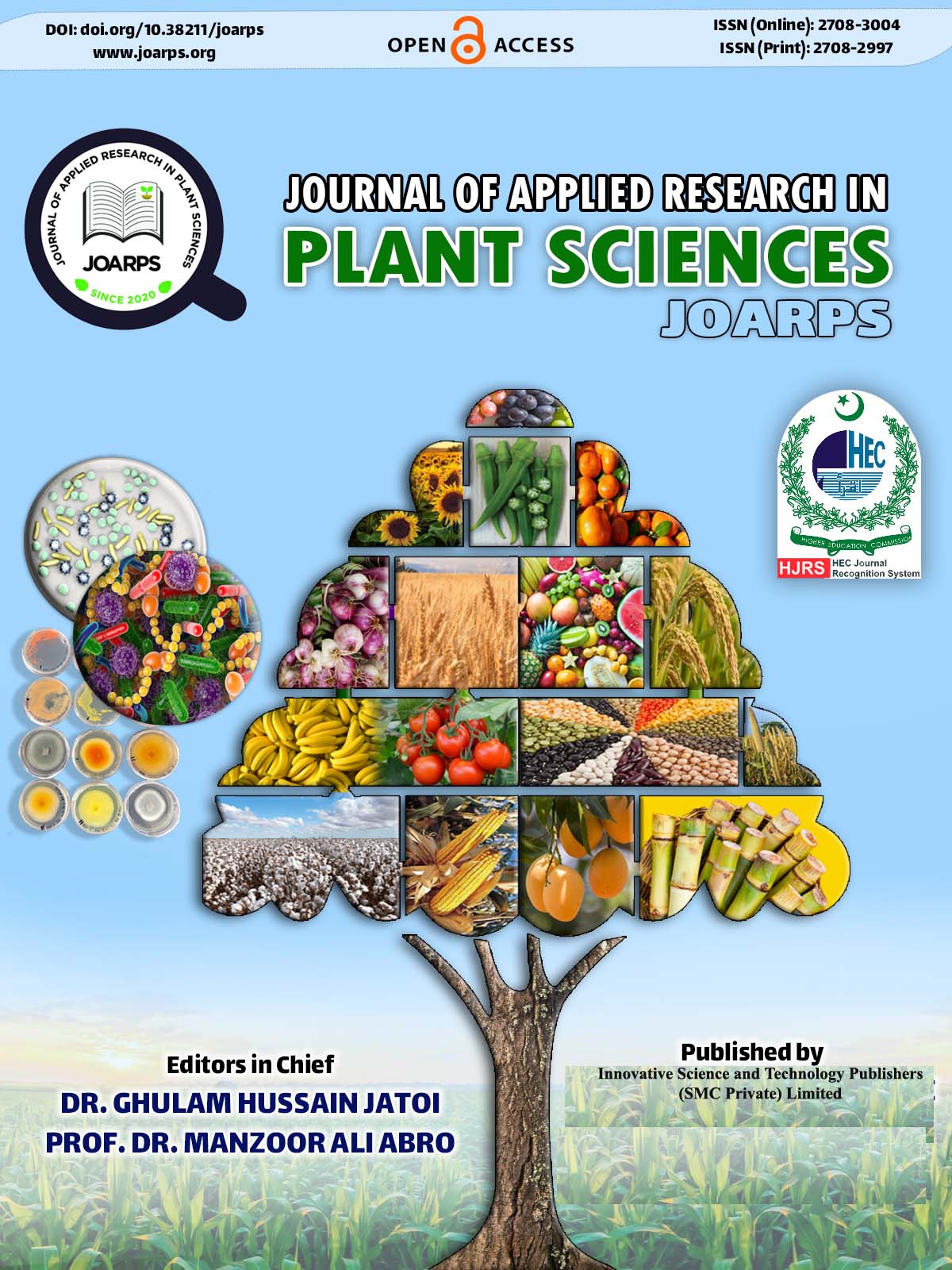Study on Correlations for Morpho-Physio Traits of Six Wheat Cultivars
DOI:
https://doi.org/10.38211/joarps.2022.3.1.24Abstract
Current research was conducted to analyze the coefficient and distribution of direct and indirect influence of yield components and earliness characteristics in wheat genotypes. Both experiments were carried out at the Pot House of the (NIA Nuclear Institute of Agriculture, Tandojam) (Latitude: 25.433. Longitude: 68.533), the experiment was established as a randomized complete block design (RCBD). There were six varieties of wheat, namely IBWSN1010, IBWSN 1025, TD1, ESW9525 Chakwal86 and Khirman, which were used to study the correlation coefficient between morphological and physiological traits. The study was based on fifteen (15) morphologically and physiologically traits that were observed. The analysis of variance showed significant differences between the characteristics of the varieties. The ESW9525 showed better performance for all morphological and physiological traits. The correlation and the coefficient analysis showed that the days to maturity and the days to growth predicted significant positive predictions related to the height of the plant (cm) and the length of the ear. Days to 75% heading and days to 75% maturity showed negative and positive effects for osmotic potential, relative water content in% and total chlorophyll content in%. Plant height (cm) had negative and positive and significant with tiller plant-1. Therefore, in our research trial, variety ESW9525 may be favorable for hybridization in order to produce a promising and drought tolerant wheat cultivar
Downloads
References
Ali, M. A., Nawab, N. N., Rasool, G. H. U. L. A. M., & Saleem, M. U. H. A. M. M. A. D. (2008). Estimates of variability and correlations for quantitative traits in Cicer arietinum. J. Agric. Soc. Sci, 4: 177-179.
Dodig, D., Savić, J., Kandić, V., Zorić, M., RADOVIĆ, B. V., Popović, A., & Quarrie, S. (2016). Responses of wheat plants under post-anthesis stress induced by defoliation: I. Contribution of agro-physiological traits to grain yield. Experimental Agriculture, 52:(2): 203-223. DOI: https://doi.org/10.1017/S0014479715000034
Farooq, J., Khaliq, I., Ali, M. A., Kashif, M., Rehman, A. U., Naveed, M., & Farooq, A. (2011). Inheritance pattern of yield attributes in spring wheat at grain filling stage under different temperature regimes. Australian Journal of Crop Science, 5(13): 1745-1753.
Gomez, K. A., & Gomez, A. A. (1984). Statistical procedures for agricultural research. John Wiley & Sons.
Habibpor, M., Valizadeh, M., Shahbazi, H., & Ahmadizadeh, M. (2011). Study of drought tolerance with cell membrane stability testing and relation with the drought tolerance indices in genotypes of wheat (Triticum aestivum L.). World Applied Sciences Journal, 13(7): 1654-1660.
Jaleel, C. A., Manivannan, P. A. R. A. M. A. S. I. V. A. M., Wahid, A., Farooq, M., Al-Juburi, H. J., Somasundaram, R. A. M. A. M. U. R. T. H. Y., & Panneerselvam, R. (2009). Drought stress in plants: a review on morphological characteristics and pigments composition. Int. J. Agric. Biol, 11(1): 100-105.
Jatoi, W. A., Baloch, M. J., Kumbhar, M. B., Khan, N. U., & Kerio, M. I. (2011). Effect of water stress on physiological and yield parameters at anthesis stage in elite spring wheat cultivars. Sarhad J. Agric, 27(1): 59-65.
Khakwani, A. A., Dennett, M. D., & Munir, M. (2011). Early growth response of six wheat varieties under artificial osmotic stress condition. Pak. J. Agric. Sci, 48: 121-126.
Martínez, I. G., Prat, C., Ovalle, C., del Pozo, A., Stolpe, N., & Zagal, E. (2012). Subsoiling improves conservation tillage in cereal production of severely degraded Alfisols under Mediterranean climate. Geoderma, 189: 10-17. DOI: https://doi.org/10.1016/j.geoderma.2012.03.025
Mary, S. S & Gopalan, A. (2006). Dissection of genetic attributes yield traits of fodder cowpea in F3 and F4. Journal of Applied Sciences Research, 2: 805-808.
Mwadzingeni, L., Shimelis, H., Dube, E., Laing, M. D., & Tsilo, T. J. (2016). Breeding wheat for drought tolerance: Progress and technologies. Journal of Integrative Agriculture, 15(5): 935-943. DOI: https://doi.org/10.1016/S2095-3119(15)61102-9
Hassan, N. M., El-Bastawisy, Z. M., El-Sayed, A. K., Ebeed, H. T., & Alla, M. M. N. (2015). Roles of dehydrin genes in wheat tolerance to drought stress. Journal of advanced research, 6(2): 179-188. DOI: https://doi.org/10.1016/j.jare.2013.11.004
Rajper, A. A., Baloch, S. K., Baloch, K., Ahmed, S., Kaleri, A. A., Leghari, A. L., & Kaleri, R. R. (2018). 14. Analysis path coefficient of yield earliness traits in wheat (Triticum aestivum L.). Pure and Applied Biology, 7(1): 112-120. DOI: https://doi.org/10.19045/bspab.2018.70014
Shamsuddin, A. K. (1987). Path analysis in bread-wheat. Indian Journal of Agricultural Sciences, 57: 47-49.
Sheron, Z., Lauthra, O. S & Kuhad, M. S. (1986). Association of physiological and biochemical character with the yield of rain fed. Plant Breeding, 56, 54-27.
Simane, B. (1993). Drought resistance indurum wheat. ISBN9054851627.See discussions, stats, and author profiles for this publication at
Singh, G. P., & Chaudhary, H. B. (2006). Selection parameters and yield enhancement of wheat (Triticum aestivum L.) under different moisture stress conditions. Asian Journal of Plant Sciences. 5: 894-898 DOI: https://doi.org/10.3923/ajps.2006.894.898
Soomro, F. A., Mujtaba, S. M., Soomro, A. A., Soomro, A. A., & Jian, Z. H. A. N. G. (2014). A route-map to the analysis of drought stress tolerance in Wheat (Triticum aestivum L.) genotypes. Eur Acad Res, 2: 12328-38.
Singh, S. (2010). Correlation and path coefficient analyses in sunflower. Journal of Plant Breeding and Crop Science, 2(5):129-133.
Downloads
Published
How to Cite
Issue
Section
License
Copyright (c) 2022 Aamir Ali Abro, Abdul Ghaffar Khoso, Khalid Ahmed Eisa Eisawi, Ahmed Elsayed Abdelghany Abdelghany, Maksat Batyrbek Batyrbek, Naveed Yaseen Sial; Saba Ambreen Memon, Rimsha Larik; Muhammad Akhta, Bhart Malhi, Muhammad Usman Zahoor

This work is licensed under a Creative Commons Attribution 4.0 International License.






